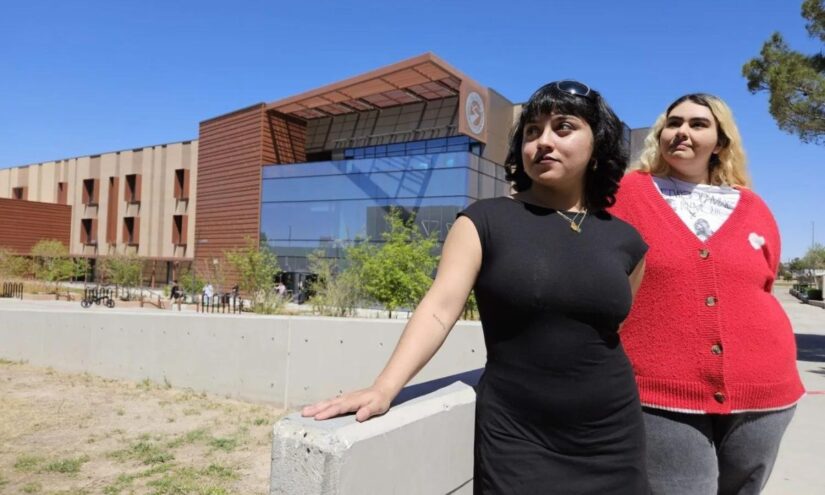During this summer, a team of students from MIT embarked on a journey to the sou …
Texas College Program Partners with Young Voters to Provide Election Poll Work Experience
Carlos Changemaker

Young adults in El Paso County abstain from voting for various reasons, but El Paso Community College is launching a program to address this issue through peer communication. The initiative involves students serving as paid nonpartisan poll workers atelection sites.
El Paso Community College recently introduced the Tejano Pollworker Fellows program, aiming to foster civic engagement and voter education. This includes guidance on voter registration, selecting a party affiliation, understanding sample ballots, operating voting machines, and grasping the general electoral process.
Crystal Robert, the associate professor of speech communication at EPCC and program director for the fellows, emphasized the importance of reducing barriers by providing essential voter guidance.
Despite the initiative, some young adults at EPCC cite reasons for their demographic’s voting disengagement, including political divisiveness, uninspiring candidates, and time constraints due to work, school, and family commitments. Others were dissuaded by familial influences or past electoral disappointments.
To address these challenges, Robert aims to enlist at least 50 students per semester over two years as poll workers. The students will be trained to fulfill various responsibilities at polling locations, including assisting with setup, verifying voter identification, distributing ballots, and offering aid as needed.
Encouraging young people to participate in voting by seeing peers at the polls is a key aspect of the program’s strategy.
Following the recent March 5 primary, several fellows have already served as poll workers, with more set to undergo training for the upcoming May 28 runoff.
EPCC natives Mayeli Robles and Andrea Dominguez are among the initial poll worker fellows, sharing positive experiences with the program. Serving as election poll workers provides practical experience, enjoyment, and financial incentives, with the hourly wage set to rise to $15 in November, in addition to a $200 stipend.
In conversations at EPCC’s Valle Verde campus, Robles and Dominguez reflected on their Election Day engagements, highlighting the program’s impact on their political awareness and aim to educate other young adults.
Robles, a biology major, was stationed at the Family Youth Services Center polling site, where she encouraged voter turnout. Despite limited youth participation, she found fulfillment in contributing to the electoral process.
Dominguez, pursuing multidisciplinary studies, expressed her motivation to engage further in community activities and educate peers on the importance of informed voting decisions.
Assembling at the EPCC Rio Grande Campus voting site, both Robles and Dominguez observed the voting behaviors of young and general voters, recognizing the significance of each individual exercising their democratic rights.
For Dominguez, the program’s value extended beyond the technical aspects of election operations to fostering empathy and understanding for diverse political perspectives.
Encouraging Civic Participation
Richard Pineda, chair and associate professor of communication at the University of Texas at El Paso, recognizes the importance of initiatives that engage college-aged voters to emphasize civic responsibilities.
Efforts like the Tejano Pollworker Fellows program serve to remind students of the stakes involved in elections and prompt a sense of civic duty, vital for a well-informed electorate.
Ricardo Sanchez, an EPCC student, overcame initial hesitations about electoral participation to vote for the first time, underscoring the transformative impact of understanding the voting process and recognizing personal agency in shaping political outcomes.
Promoting Youth Inclusion in Elections
El Paso County houses over 500,000 registered voters, including approximately 120,000 individuals under the age of 30. Despite the potential youth voting base, only a small fraction engaged in the recent election, underscoring the need for initiatives like the Tejano Pollworker Fellows program.
Funded by the U.S. Election Assistance Commission, the program at EPCC received a grant to boost youth involvement in the electoral process and address the shortage of poll workers nationwide, emphasizing the critical role of younger demographics in election operations.
As the program expands, Brenda Negrete, overseeing recruitment for the Elections Department, anticipates the fellows program enhancing voter services by providing trained poll workers for upcoming elections and ensuring efficient polling site operations.
The rigorous training sessions, covering election procedures and polling site setup, prepare the student workers for their roles in facilitating a smooth voting experience for the community.
In light of the program’s impact on fostering positive voter engagement and instilling a sense of civic duty, EPCC’s endeavor aligns with broader efforts to cultivate an informed and participatory electorate.


